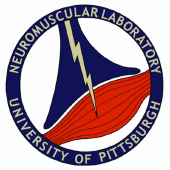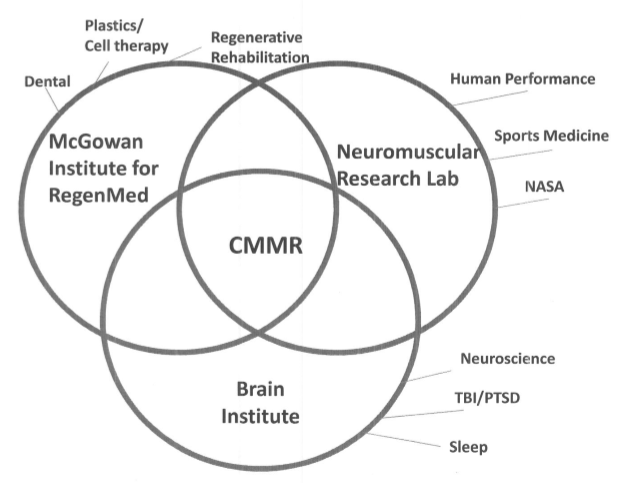 Since its establishment in 2012, CMMR has worked collaboratively with the McGowan Institute to address key challenges in military medical research. From the fields of cellular therapeutics, tissue engineering, and biomaterials, CMMR has partnered with McGowan to accelerate technology transition of new therapies, materials and processes to advance treatment options for severely wounded service members. CMMR has transitioned in 2018 to working very closely with McGowan, as the institute continues to lead, with Wake Forest University, the Armed Forces Institute for Regenerative Medicine (AFIRM). As principals in the consortium, the Pitt-Wake team is beginning plans for active participation and leadership in AFIRM III (2019-24).
Since its establishment in 2012, CMMR has worked collaboratively with the McGowan Institute to address key challenges in military medical research. From the fields of cellular therapeutics, tissue engineering, and biomaterials, CMMR has partnered with McGowan to accelerate technology transition of new therapies, materials and processes to advance treatment options for severely wounded service members. CMMR has transitioned in 2018 to working very closely with McGowan, as the institute continues to lead, with Wake Forest University, the Armed Forces Institute for Regenerative Medicine (AFIRM). As principals in the consortium, the Pitt-Wake team is beginning plans for active participation and leadership in AFIRM III (2019-24).
 CMMR works very closely with the NMRL team. Dr. Brad Nindl, PhD, COL USAR, Director of NMRL also serves as Senior Military and Scientific Advisor to CMMR and Ron Poropatich MD (Ret/Col/USA) is the Medical Director of NMRL. The mission of NMRL is to work to mitigate musculoskeletal injuries and optimize human performance through innovative basic and applied research. This research will lead to improved resiliency and performance among civilian athletes and military populations. Very simply stated CMMR intends, over time, to partner closely with NMRL to resource programs and projects for human systems optimization.
CMMR works very closely with the NMRL team. Dr. Brad Nindl, PhD, COL USAR, Director of NMRL also serves as Senior Military and Scientific Advisor to CMMR and Ron Poropatich MD (Ret/Col/USA) is the Medical Director of NMRL. The mission of NMRL is to work to mitigate musculoskeletal injuries and optimize human performance through innovative basic and applied research. This research will lead to improved resiliency and performance among civilian athletes and military populations. Very simply stated CMMR intends, over time, to partner closely with NMRL to resource programs and projects for human systems optimization.
The mission of the Swanson School of Engineering is to produce highly qualified engineers and useful creative research and technology through academic excellence. The faculty and staff at the University of Pittsburgh Swanson School of Engineering will be recognized for providing excellent educational programs, for conducting leading-edge research and for creating innovative industrial partnerships.
 In collaboration with the McGowan Institute and Pitt, experts at CIRM develop new regenerative-medicine technologies and treatments for people suffering from head and facial injuries, scarring from burns, pain from amputation, and limb and muscle loss.
In collaboration with the McGowan Institute and Pitt, experts at CIRM develop new regenerative-medicine technologies and treatments for people suffering from head and facial injuries, scarring from burns, pain from amputation, and limb and muscle loss.
The University of Pittsburgh Brain Institute (UPBI) is composed of 12 institutes and research centers dedicated to promoting basic research in new and expanding areas of neuroscience. CMMR works closely with clinicians and scientists across UPBI centers and institutes to engage with policies and programs across the Department of Defense.
CMMR has a strong collaborative relationship with the Pitt Concussion Research Lab. The University of Pittsburgh Concussion Research Laboratory is part of the UPMC Sports Medicine Concussion Program directed by Dr. Micky Collins. The research program is directed by Dr. Anthony Kontos. The program is the premier concussion clinical and research program in the United States . The program has over 25 faculty and staff at several sites in the Pittsburgh area. Currently CMMR has collaborated with a grant for studying brain network activation in military personnel with post-traumatic migraine following TBI (PI- Dr. Anthony Kontos).
The University's Safar Center, named for Pitt anesthesiologist and "Father of CPR" Peter Safar (pictured at left), identifies and promotes ever-improving methods of preventing premature death and reducing associated disability from trauma and cardiac arrest, while also providing training to future resuscitation researchers.
CMMR is proud and honored to be working closely with the University of Pittsburgh Innovation Institute, as it is the University's hub for innovation and entrepreneurship. Since the Fall of 2017, CMMR has helped to facilitate an ongoing relationship between the Innovation Institute and the Army Research Lab (ARL) in several important issue areas related to basic science, technology, and industry partnerships.


 The MilTeenChat™ smartphone app is designed to help teenagers with parents in the military create a community, where teens with similar experiences can provide support to each other and share knowledge. Support is also available through educational materials and coping tools based on the Teaching Kids to Cope (TKC) program developed by faculty at the University of Pittsburgh. Regular interactions in the app are rewarded to motivate users to interact with the app and each other. The MilTeenChat™ smartphone app allows users to communicate using text messages and digital photographs in a manner like Instagram, Snapchat, and Facebook. Military teenagers who use the app can create a profile, share personal stories, and find resources to increase self-efficacy in interactions with family, friends, and at school. To address social network safety concerns, the MilTeenChat™ app integrates monitoring functionality provided by Bark Technologies to scan conversations and content. Bark's application programming interfaces (APIs) detect and provide automatic alerts for signs of cyberbullying, depression, online predators, adult content, and more. MilTeenChat™ requires contact information and permission from the non-deployed parent of the user. The parent assumes responsibility for the teenager's use of the MilTeenChat app and will receive automatic alerts if potential issues are detected.
The MilTeenChat™ smartphone app is designed to help teenagers with parents in the military create a community, where teens with similar experiences can provide support to each other and share knowledge. Support is also available through educational materials and coping tools based on the Teaching Kids to Cope (TKC) program developed by faculty at the University of Pittsburgh. Regular interactions in the app are rewarded to motivate users to interact with the app and each other. The MilTeenChat™ smartphone app allows users to communicate using text messages and digital photographs in a manner like Instagram, Snapchat, and Facebook. Military teenagers who use the app can create a profile, share personal stories, and find resources to increase self-efficacy in interactions with family, friends, and at school. To address social network safety concerns, the MilTeenChat™ app integrates monitoring functionality provided by Bark Technologies to scan conversations and content. Bark's application programming interfaces (APIs) detect and provide automatic alerts for signs of cyberbullying, depression, online predators, adult content, and more. MilTeenChat™ requires contact information and permission from the non-deployed parent of the user. The parent assumes responsibility for the teenager's use of the MilTeenChat app and will receive automatic alerts if potential issues are detected.
On May 20, 2018, the University of Pittsburgh School of Nursing and the Center for Military Medicine Research hosted a launch of the app. Thus far, there has been positive feedback from initiatives with small focus groups, further emphasizing the need for this type of resource. In moving forward, the immediate task at hand is to now build more collaborative opportunities with other military child groups, as well as to offer summer leadership camp opportunities for MilTeenChat™ peer ambassadors to provide a strong foundation for the application.
MilTeenChat™ was created by the University of Pittsburgh School of Nursing and the Center for Military Medicine Research and in partnership with the Military Childrens Collaborative Group, Pt Pal, Bark Technologies, and military teens themselves! The app is funded by the Infinite Hero Foundation.
For more information, please visit the MilTeenChat™ site or send us a message at info@ptpal.com.
